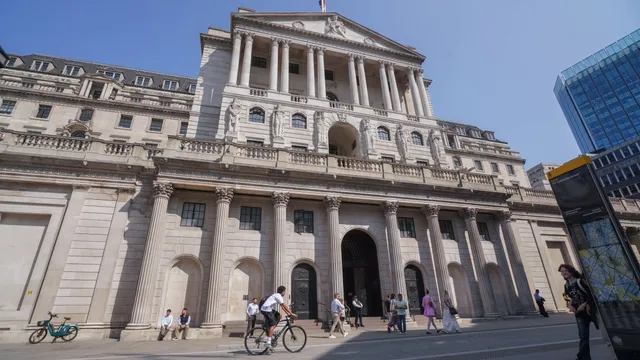
Bank of England keeps interest rate unchanged amid inflation concerns
2025-06-19 18:15- Inflation in the UK has recently decreased to 3.4% in May from 3.5% in April.
- The Bank of England is anticipated to hold interest rates at 4.25% due to ongoing economic uncertainties.
- Experts agree that current inflation levels are above the Bank's target, indicating no immediate likelihood of rate cuts.
Express your sentiment!
Insights
In the United Kingdom, inflation fell slightly to 3.4% in May, a modest decrease from 3.5% the previous month. Despite this drop, the Bank of England's decision-makers appear unwilling to lower the interest rate from its current level of 4.25% at their upcoming meeting. The reduction in inflation is attributed to a decrease in both services and core inflation, although concerns remain regarding the underlying strength of consumer prices and wage growth. The shift in inflation was clouded by an earlier miscalculation in April’s inflation figures, potentially complicating the understanding of the recent trends. Key economic figures indicated no significant encouragement for rate cuts. Analysts suggest the Monetary Policy Committee (MPC) will likely vote to maintain rates due to persistent inflation pressures and turbulent regular earnings growth. Experts believe that higher oil prices following geopolitical tensions in the Middle East might pressure inflation higher, contributing to the committee’s cautious stance. Existing inflation remains above the Bank of England's target of 2%, reinforcing skepticism that current economic conditions warrant an interest rate reduction. Reports have shown that a sustained pause in rate changes could lead to further complexities in managing economic factors, including housing prices and consumer spending. The latest data reflects an annual house price growth slowdown, also affected by changes in stamp duty policies. The market's response has started to show mixed signals, where higher borrowing costs continue to influence economic activities and consumer confidence. The overall assessment of the economic landscape suggests that despite signs of easing inflationary pressures, rate stability might be the preferred action for the Bank of England. As external factors like oil dependency loom large over the domestic economy, maintaining rates might prevent premature economic stimulus that could lead to inflation spiraling out of control. The MPC faces challenging decisions ahead, needing to weigh multiple economic indicators before next determining its interest rate policy.
Contexts
The UK has experienced significant inflation trends over the past few years, with variations arising from multiple economic factors. As of June 2025, inflation rates reflect both global and domestic pressures affecting the economy. The aftermath of the COVID-19 pandemic, supply chain disruptions, rising energy prices, and geopolitical tensions have all contributed to the evolving landscape of inflation in the UK. The Bank of England's monetary policy adjustments have attempted to respond to these challenges, aiming to stabilize prices while supporting economic growth. In recent months, inflation has exhibited signs of volatility, primarily driven by external shocks such as fluctuating oil prices and ongoing supply challenges in various sectors. It is essential to analyze consumer price indices (CPI) and other relevant metrics to understand the current inflationary environment fully. As of June 2025, inflation rates have reached levels not seen in decades, prompting concerns about the cost of living, household spending, and overall economic confidence. Consumer sentiment appears to be affected as people adjust their budgets amidst rising prices. The government has implemented measures to mitigate the impact of inflation on everyday consumers, including targeted support for low-income households and efforts to stabilize energy costs. However, balancing these interventions with long-term economic health remains a critical challenge. The potential for inflationary pressures to persist in the coming months could lead to the need for further policy adjustments, including interest rate changes, should inflation not show signs of trending downwards. As we move further into 2025, the UK economy faces a pivotal point. Both businesses and consumers are navigating the complexities of an inflationary environment, with implications for employment, investment, and overall economic stability. Continued monitoring of key economic indicators will be vital in understanding whether the current inflationary trajectory stabilizes or escalates, as policymakers weigh the best approaches for fostering sustainable growth in a challenging economic landscape.